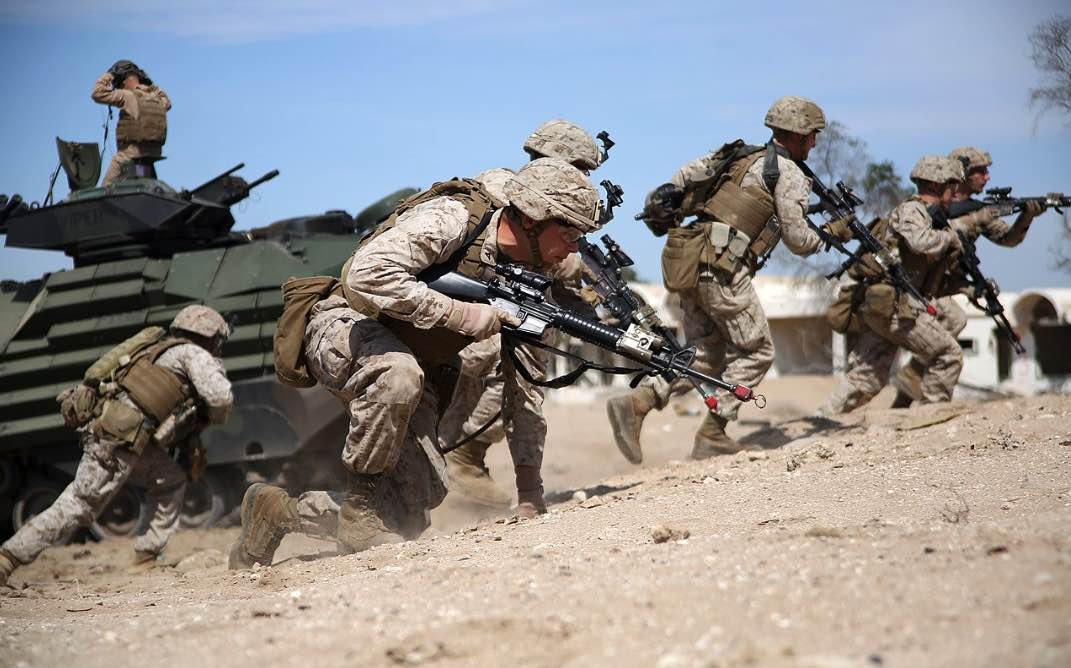

Welcome to this week’s installment of The Intelligence Brief… the prospect of another U.S. federal government shutdown has many Americans on edge, and that includes top officials within the Department of Defense. This week, we’ll be looking at 1) efforts on Capitol Hill in the midst of the looming shutdown, 2) the DoD’s response and what it could mean for U.S. national security, and 3) what will happen to the U.S. military if a shutdown occurs.
Quote of the Week
“It was already a perfect storm. And now there’s a potential government shutdown.”
– Greg Valliere, policy strategist
Latest News: In recent coverage from The Debrief, signals from the Trappist 1 star system have revealed “ghost signals” that could affect the search for life on its habitable zone planets. Elsewhere, the USAF has tasked Northop Grumman with building an air-to-ground weapon that will represent the next generation of air power and defense. Be sure to check out all our latest headlines at the end of this week’s Intelligence Brief newsletter.
Podcasts: In podcasts from The Debrief, over on The Micah Hanks Program, we examine a compelling witness account of an unusual aircraft observed over Eastern Canada in the early 1980s. Was it a secret U.S. technology, or something else? Meanwhile, this week on The Debrief Weekly Report, MJ and Stephanie discuss whether AI can make art, and Europe’s growing problem with Fire Ants. You can subscribe to all of The Debrief’s podcasts, including audio editions of Rebelliously Curious, by heading over to our Podcasts Page.
Video News: On the latest episode of Rebelliously Curious, Jim Smith, Professor of Environmental Science in the School of the Environment, Geography, and Geosciences at the University of Portsmouth, joins Chrissy Newton to discuss the science and what we should know about radioactive wastewater. Also, check out the latest episode of Ask Dr. Chance where Dr. Glenn answers questions about climate change. You can get other great content from The Debrief on our official YouTube Channel.
Americans Face Another Potential U.S. Federal Government Shutdown
Thursday morning, chances of a partial shutdown of the U.S. federal government loomed near as the U.S. Senate and House moved forward with conflicting funding plans.
A procedural vote on a stopgap funding bill that has garnered bipartisan support in the chamber was scheduled by the Senate today, as House of Representatives prepared for late sessions on several appropriations bills which “have no chance of becoming law and would not alone prevent a shutdown even if they did,” according to Reuters.


Such a shutdown, if it happens, will be the fourth to have occurred within the last decade.
As many Americans whose employment would be affected by the potential shutdown prepare for the worst, among those who are also raising concerns about the negative impact of a federal government shutdown are top Pentagon officials, who say it could also potentially have grave consequences for U.S. National Security.
The DoD Weighs in on a Possible Government Shutdown
“The Chinese army is not facing a shutdown nor is Russia shutting down its efforts to conquer Ukraine,” read an article that appeared on the DoD’s website this week.
“A shutdown would degrade and impact our operational planning and coordination, impact our more than 800,000 civilians, and severely diminish our ability to recruit and retain quality individuals for military service,” a DoD statement featured in the article read.
Deputy Defense Secretary Kathleen Hicks said this week that all attempts must be made to “avert any kind of effect that a shutdown could have, not just on the Defense Department but throughout the federal government.”
Hicks advised that a continuing resolution, although far from preferable, would be better in the event that lawmakers are able to prevent a complete government shutdown, as it would allow appropriations at levels comparable to the last fiscal year for a limited time to continue.
“As bad as it could be to have a [continuing resolution] — which we always want to avoid — it would be even worse for the defense of the nation to have a shutdown,” Hicks was quoted saying.
Speaking from the Pentagon this week, Deputy Pentagon Press Secretary Sabrina Singh said a shutdown “literally puts the government on a complete standstill.”


“The U.S. military’s going to continue to do its job and protect our national security interests and, you know, of our allies and partners,” Singh said. “When you don’t have your full operating capacity to be able to help with the mission, to be able to conduct an exercise or training, of course, that gets to our national security and readiness,” she added.
What Happens to the DoD if a Government Shutdown Occurs
If a lapse in appropriations occurs, the DoD is still tasked with defending and protecting the nation and conducting its military operations globally. Fortunately, there are mechanisms that will enable the military to continue to function if the shutdown does happen.
White House National Security Council spokesperson John Kirby said this week that U.S. service members would continue reporting for duty—without pay—for the duration of the shutdown, while hundreds of thousands of civilian DoD employees would be furloughed.
The Defense Working Capital Fund would allow for funding to continue for certain activities contained within agencies that include the Defense Information Systems Agency, the Defense Logistics Agency, and the Defense Finance and Accounting Agency. The Defense Commissary Agency would also keep overseas facilities open, although commissaries on the U.S. mainland would still be closed.
However, the DoD’s primary concerns in relation to U.S. national security involve the strategic problems that arise from a government shutdown.
Lost Time in a Critical Period
Pointing to funding complications that arise from a shutdown, as well as lost time, DoD officials cited in the article warned that losses incurred for military planning and training during a shutdown could end up being critical, particularly amidst rising tensions with Beijing.
“No amount of funding can make up for lost time,” a portion of a DoD statement read. “A shutdown impacts our ability to outcompete the PRC [People’s Republic of China] — it costs us time as well as money, and money can’t buy back time, especially for lost training events.”


From the economic impact on active duty military personnel and their families, to the closure of facilities that would be of key importance to maintaining national security, a government shutdown will negatively impact virtually all areas of the DoD.
Bottom line, a shutdown “would degrade and impact our operational planning and coordination, impact our more than 800,000 civilians, and severely diminish our ability to recruit and retain quality individuals for military service,” the DOD statement read.
This, in addition to all the other government jobs that would be impacted if a shutdown cannot be avoided, could mean an added layer of trouble awaits the U.S. in the days ahead and during a potentially critical period for U.S. national security.
“So the shutdown is the worst thing that could happen,” Deputy Pentagon Press Secretary Sabrina Singh said this week.
“We’re hoping that Congress can find a way to avert that, but, you know, planning for the worst,” Singh added.
That concludes this week’s installment of The Intelligence Brief. You can read past editions of The Intelligence Brief at our website, or if you found this installment online, don’t forget to subscribe and get future email editions from us here. Also, if you have a tip or other information you’d like to send along directly to me, you can email me at micah [@] thedebrief [dot] org, or Tweet at me @MicahHanks.


Here are the top stories we’re covering right now…
- Scientists Design and Test First Ever Working Quantum Engine
Scientists have designed and tested the world’s first quantum engine, which may revolutionize the energy, computing, and power industries.
- “Beer Goggles” Debunked? New Research Reveals “Liquid Courage” Influences Attractiveness When Drinking
Debunking ‘beer goggles’, a new study reveals alcohol boosts ‘liquid courage’, not altered attractiveness perception.
- ‘Ghost Signals’ from Trappist-1 Exoplanetary System Revealed by James Webb Space Telescope
Readings from the Trappist 1 star system have revealed “ghost signals” that could affect the search for life on its habitable zone planets.
- New Details Emerge in Development of U.S. Air Force Weapon Marking a ‘New Generation of Air Power’
The USAF has tasked Northop Grumman with building an air-to-ground weapon that will represent the next generation of air power and defense.
- “Holy Grail of Astrobiology”: Breakthrough Discovery Could Finally Solve Mystery of Life on Other Planets
An exciting new tool that researchers are describing as the “holy grail of astrobiology” may finally answer once and for all if there is life on other planets.
- In-Depth: OSIRIS-REx Mission Achieves Historic Milestone with NASA’s Successful Delivery of Asteroid Samples to Earth
A mission to bring samples from a distant asteroid back to Earth made history on Sunday with the success of NASA’s OSIRIS-Rex.
- Black Holes Tear Apart And Devour Spacetime Much Faster Than Previously Assumed, New Study Shows
New research redefines how black holes feed, challenging classic theories and solving cosmic mysteries.
- Touching a Piece of the Sky: The OSIRIS-REx Sample Return Mission
The OSIRIS-REx spacecraft, launched in 2016 towards the near-Earth asteroid named Bennu, just completed its long journey home.
- True Anomaly is Creating ‘Autonomous Orbital Vehicles’ and Space Security Tech for the U.S. Space Force
The U.S. Space Force has awarded a new research contract to True Anomaly, a space security company behind autonomous orbital vehicles and other space technologies.
- DARPA Wants Futuristic Space Weapons That Don’t Currently Exist
DARPA is asking for proposals on futuristic space weapons that don’t exist in hopes of gaining a tactical advantage over U.S. adversaries.
- U.S. Navy Unmanned Surface Vessels Complete First Pacific Journey Amidst Growing Tensions
The U.S. Navy made history with the first Pacific crossing of a pair of its unmanned surface vessels amidst rising tensions with China.
- NASA’s Report on Unidentified Anomalous Phenomena
This week we look at NASA’s new UAP report, and get commentary from Mark Rodeghier, Ph.D, the Director of the J. Allen Hynek Center for UFO Studies.
- Raytheon Bringing Deadly Wolfhound-Mounted Portable Combat Laser Weapons to the UK in October
Raytheon UK is bringing an arsenal of new versatile combat laser weapons to the United Kingdom, with plans integrate them as soon as October.
- Watch NASA’s Parker Solar Probe Plow Through a Solar Tsunami, Validating Twenty-Year Theory on Space Weather
NASA’s Parker Solar Probe just made a historic voyage through a solar eruption, validating a 20-year-old theory on space weather.
